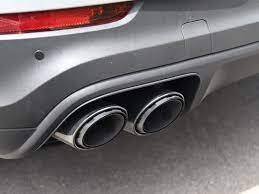When you hear exhaust noises, your muffler or pipes are likely leaking somewhere. Auto repairs to your exhaust are necessary for you and your passengers’ safety. Never put off exhaust repairs that may be needed because waiting can turn deadly! This is a basic look at what may be creating the sounds you are hearing and what type of exhaust repairs may be needed.
Muffler and pipes will all rot eventually, but some go sooner, especially if your auto has been exposed to large amounts of winter road salt or frequently taken on short-trips with a lot of stop-and-go driving. Short trips leave a great deal of condensation in your exhaust system because the muffler and pipes aren’t allowed enough time to get hot enough to evaporate the water. When the muffler is located farther from the converter found in the back of the car, moisture pools inside the muffler, rusting and eroding from within. As water mixes with the sulfur found in your exhaust, it forms extremely corrosive acids that will eat through the metal parts.
Mufflers and resonators that are mounted behind the rear axle tend to be very vulnerable to this sort of corrosion due to the fact they usually run much cooler than a front-mounted muffler. Because they create a moisture trap, they often fail due to internal corrosion.
We all know: exhaust noises mean trouble.
Something you are likely to hear with your engine running is a rattling or buzzing type of sound. This sound is sometimes caused by loose heat shields located around your catalytic converter or the exhaust pipes. Rust will weaken spot welds holding the heat shields to your exhaust system. When the shield is loose enough to vibrate it can create a rattle or buzzing that can be heard through the entire vehicle. Some noises may only be detected at certain RPMs or only when decelerating. This is due to harmonic vibrations that shake your exhaust system at a resounding frequency.
Loose heat shields are not always obvious with basic visual inspections. You can use a medium-sized screwdriver to inspect the shields, checking for looseness. If you find a loose spot weld, do not worry – loose heat shields are able to be secured again by re-welding, and sometimes by installing clamps. Replacement is recommended if a heat shield is badly rusted or has extensive damage. You should NEVER remove a loose heat shield! They are necessary to keep the extreme heat away from your floor pan and other components like fuel or brake lines that may be located nearby.
Another origin of buzzing type noises from the exhaust is harmonic resonance. This is often seen on high revving four-cylinder engines, and is usually loudest at certain RPMs or while accelerating hard with a load.
Also take note of the type of the sound coming directly from the tailpipe. If you hear a whistle or high-pitched hiss it could be a restriction within the exhaust system causing abnormally high backpressure. If your engine is lacking high-speed power and is having reduced fuel mileage, it is often a sign that the engine is having trouble exhaling.

